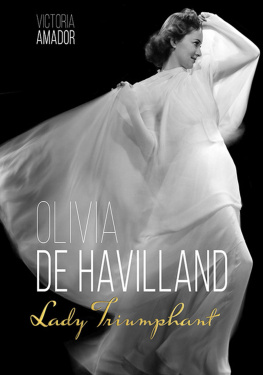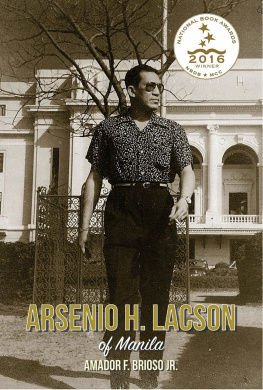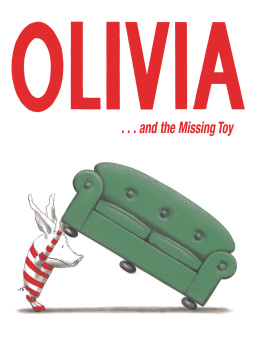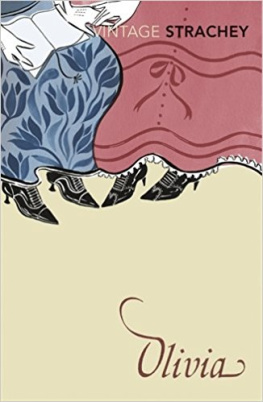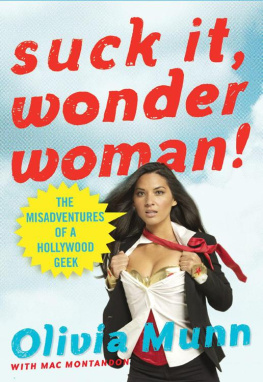Victoria Amador - Olivia de Havilland
Here you can read online Victoria Amador - Olivia de Havilland full text of the book (entire story) in english for free. Download pdf and epub, get meaning, cover and reviews about this ebook. year: 2019, publisher: The University Press of Kentucky, genre: Non-fiction. Description of the work, (preface) as well as reviews are available. Best literature library LitArk.com created for fans of good reading and offers a wide selection of genres:
Romance novel
Science fiction
Adventure
Detective
Science
History
Home and family
Prose
Art
Politics
Computer
Non-fiction
Religion
Business
Children
Humor
Choose a favorite category and find really read worthwhile books. Enjoy immersion in the world of imagination, feel the emotions of the characters or learn something new for yourself, make an fascinating discovery.
- Book:Olivia de Havilland
- Author:
- Publisher:The University Press of Kentucky
- Genre:
- Year:2019
- Rating:3 / 5
- Favourites:Add to favourites
- Your mark:
- 60
- 1
- 2
- 3
- 4
- 5
Olivia de Havilland: summary, description and annotation
We offer to read an annotation, description, summary or preface (depends on what the author of the book "Olivia de Havilland" wrote himself). If you haven't found the necessary information about the book — write in the comments, we will try to find it.
Olivia de Havilland — read online for free the complete book (whole text) full work
Below is the text of the book, divided by pages. System saving the place of the last page read, allows you to conveniently read the book "Olivia de Havilland" online for free, without having to search again every time where you left off. Put a bookmark, and you can go to the page where you finished reading at any time.
Font size:
Interval:
Bookmark:

OLIVIA DE HAVILLAND
OLIVIA DE HAVILLAND
Lady Triumphant
Victoria Amador

Due to variations in the technical specifications of different electronic reading devices, some elements of this ebook may not appear as they do in the print edition. Readers are encouraged to experiment with user settings for optimum results.
Copyright 2019 by The University Press of Kentucky
Scholarly publisher for the Commonwealth,
serving Bellarmine University, Berea College, Centre
College of Kentucky, Eastern Kentucky University,
The Filson Historical Society, Georgetown College,
Kentucky Historical Society, Kentucky State University,
Morehead State University, Murray State University,
Northern Kentucky University, Transylvania University,
University of Kentucky, University of Louisville,
and Western Kentucky University.
All rights reserved.
Editorial and Sales Offices: The University Press of Kentucky
663 South Limestone Street, Lexington, Kentucky 40508-4008
www.kentuckypress.com
Unless otherwise noted, photographs are from Photofest.
Library of Congress Cataloging-in-Publication Data
Names: Amador, Victoria, 1955 author.
Title: Olivia de Havilland : lady triumphant / Victoria Amador.
Description: Lexington : The University Press of Kentucky, 2019. | Includes bibliographical references and index.
Identifiers: LCCN 2018056745| ISBN 9780813177274 (hardcover : alk. paper) | ISBN 9780813177281 (pdf) | ISBN 9780813177298 (epub)
Subjects: LCSH: De Havilland, Olivia. | ActorsUnited StatesBiography.
Classification: LCC PN2287.D4 A625 2019 | DDC 791.4302/8092 [B]dc23
This book is printed on acid-free paper meeting
the requirements of the American National Standard
for Permanence in Paper for Printed Library Materials.

Manufactured in the United States of America.
 | Member of the Association of University Presses |
For G., S., K., J., and R., with endless gratitude and love.
CONTENTS
INTRODUCTION
Olivia and Me
In 1967 and again in 1969, Gone with the Wind was reissued to American theaters in a 70mm wide-screen print, introducing the classic to a new generation of filmgoers thirty years after its first release. Even then, the film was discussed with a mixture of admiration and concern for its representation of the Confederate, slave-owning South, yet it was still seen as a masterpiece. Along with many other viewers, I was first exposed to the film in 1969, and its grandeur possessed me.
As a young teenager in a tiny Wisconsin farming and manufacturing community, I did two things to facilitate my dreams of a wider worldI read compulsively, and I saw virtually every film that played at the local movie theater, escaping through the written word and the art of cinema. I had read Gone with the Wind in 1968, a rite of passage for many American girls of the time, often encouraged by their older relatives and teachers who had loved the Pulitzer Prizewinning novel by Atlantas Margaret Mitchell. Over a long, frigid Christmas holiday, I was captivated by the panoramic American history and histrionics, by the plot and the characters, by the archetypal American reinvention story of a woman and a nation divided, but particularly by Scarlett OHara.
I dont think it was a coincidence that this Civil Warera heroine in a Depression-era film seemed prescient when I became obsessed a few years later with David Bowies anthemic 1974 Rebel, Rebel. Like me (and virtually every other young person in the Western world), Scarlett was on a mission to live life as she chose. Even more relevant to me and to many other young women, she was, in many ways, a protofeminist. Scarlett didnt like limits or being treated like a child when she knew exactly what she wantedpower, self-determination, and a self-forged identity. She wanted romance with Ashley Wilkes and was ruthless about it. She loved her family and Tara despite herself, and she used every skill, talent, attraction, and strategy she had to fight for their survival. Scarlett didnt have the awareness to see the personal as political, but she did refute the limitations on her gender and her defeated land. Above all, she wanted to do every and any damned thing she desired.
But what about Melanie Hamilton Wilkes? Too nice to emulate. A true personification of Patmore Coventrys treacly tribute to Victorian-era domestic enslavement, An Angel in the House. Melanie was a loyal friend to Scarlett, but who could possibly want to be that good? Melanie wasnt flashy or outwardly fierce; she wasnt funny, wasnt particularly captivating. Margaret Mitchells description of Melanie offers a character who seems pallid compared with Scarlett:
She was a tiny, frailly built girl, who gave the appearance of a child masquerading in her mothers enormous hoop skirtsan illusion that was heightened by the shy, almost frightened look in her too large brown eyes. She had a cloud of curly dark hair which was so sternly repressed beneath its net that no vagrant tendrils escaped, and this dark mass, with its long widows peak, accentuated the heart shape of her face a sweet, timid face but a plain face, and she had no feminine tricks of allure to make observers forget its plainness. She lookedand wasas simple as earth, as good as bread, as transparent as spring water.1
Melanie was a lovely role model for someone bucking for sainthood. She was not, however, an immediately obvious heroine for a troubled teen.
Or so I believed until I saw the film when it finally came to my little Wisconsin town in 1969. I went back several times, alone and with friends. It is the only epic Ive ever tolerated, and it became my favorite all-time film: the Technicolor, Clark Gable, Vivien Leighs magnificence in one of the greatest female screen performances in cinema history, the supporting cast, the Civil War, the sweeping music, the story of survival. Certainly, I was enraptured with Leighs Scarlett, as I expected to be. What was unexpected, however, was my newfound appreciation of Melanie. As portrayed by Olivia de Havilland, Melanie was as indomitable as Scarlett.
I knew de Havillands spirited work from her many films with Errol Flynn shown on television. Her maleficence in Hush Hush, Sweet Charlotte and Lady in a Cage, both viewed at the cinema when I was a burgeoning obsessive filmgoer, was delicious to me. But in the actresss Melanie, I saw a character with strength and gentleness, true manners, and an authentic spirit. Her Melanie captured more of Margaret Mitchells evaluation of that Hamilton girl: Ashley had sat on a stool at Melanies feet, apart from the other guests, and talked quietly with her, smiling the slow drowsy smile that Scarlett loved. What made matters worse was that under his smile a little sparkle had come into Melanies eyes, so that even Scarlett had to admit that she looked almost pretty. As Melanie looked at Ashley, her plain face lit up as with an inner fire, for if ever a loving heart showed itself upon a face, it was showing now on Melanie Hamiltons.2
Olivias Melanie was no second chorus to Scarletts beauty or fire; Olivias Melanie was suddenly interesting. After all, Melanie married Ashley (played by Leslie Howard) and gave birth during the siege of Atlanta; she cradled the weeping Rhett Butler (played by Clark Gable) when he feared Scarlett would die; she was aware of the gossip about Ashley and Scarlett and loved them both regardless; she was the best friend any woman could have. Scarlett was my idealized self; Melanie was the self I might become. I decided to write a fan letter.
Next pageFont size:
Interval:
Bookmark:
Similar books «Olivia de Havilland»
Look at similar books to Olivia de Havilland. We have selected literature similar in name and meaning in the hope of providing readers with more options to find new, interesting, not yet read works.
Discussion, reviews of the book Olivia de Havilland and just readers' own opinions. Leave your comments, write what you think about the work, its meaning or the main characters. Specify what exactly you liked and what you didn't like, and why you think so.

